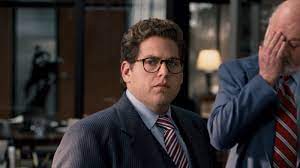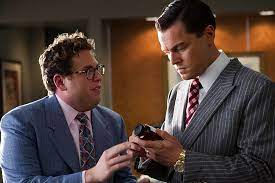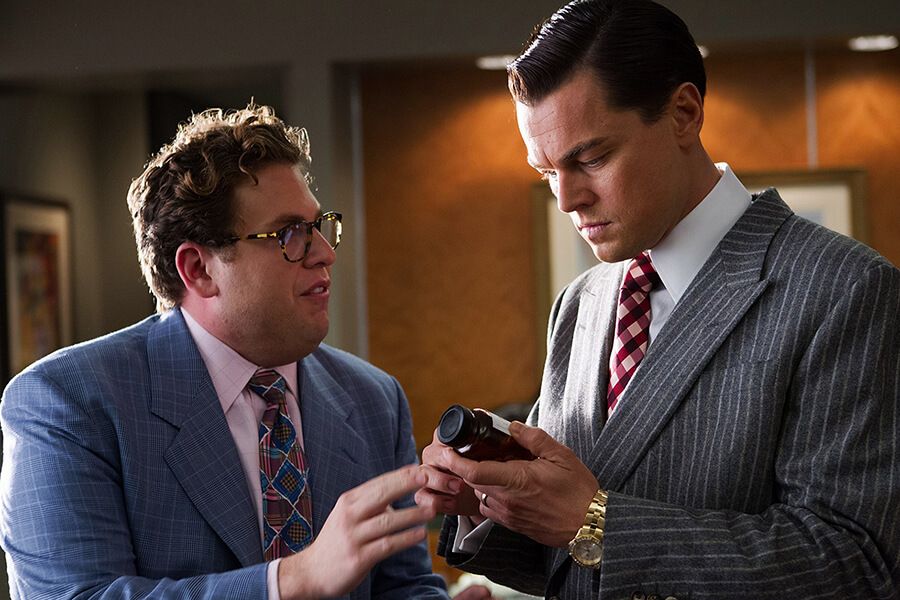🎬 The Wolf of Wall Street (2013)
🎬 The Wolf of Wall Street (2013)
Director: Martin Scorsese
Genre: Biographical Comedy-Drama, Crime
Screenplay: Terence Winter
Based On: The Wolf of Wall Street by Jordan Belfort
Cast: Leonardo DiCaprio, Jonah Hill, Margot Robbie, Matthew McConaughey, Kyle Chandler, Rob Reiner, and more
Plot Summary
Set in the late 1980s and 1990s, The Wolf of Wall Street chronicles the rise and fall of Jordan Belfort (Leonardo DiCaprio), a charismatic and ambitious stockbroker who built a financial empire through greed, corruption, and excess. Based on the true story of Belfort’s memoir, the film offers a wild ride through the hedonistic and often illegal world of high finance.
Act I: The Rise
Jordan Belfort starts his career as a Wall Street stockbroker under the mentorship of Mark Hanna (Matthew McConaughey), who introduces him to the debauchery and ruthless tactics of the finance world. After losing his job due to the stock market crash of 1987, Jordan shifts his focus to penny stocks—low-value stocks with high commissions. He starts his own brokerage firm, Stratton Oakmont, recruiting a band of misfits, including his eccentric and loyal partner, Donnie Azoff (Jonah Hill).
The firm thrives by using aggressive sales tactics and deceptive practices to defraud investors, earning Jordan and his team massive wealth. Jordan adopts a lavish lifestyle filled with mansions, yachts, drugs, and wild parties.
Act II: The Excess
As Stratton Oakmont grows, so does Jordan’s appetite for excess. He marries Naomi Lapaglia (Margot Robbie), a stunning model, after leaving his first wife. His life spirals into a whirlwind of drug addiction, infidelity, and increasingly outrageous behavior. Meanwhile, FBI agent Patrick Denham (Kyle Chandler) begins investigating the firm’s fraudulent practices.
Jordan’s greed leads him to make reckless decisions, including smuggling money into Switzerland to evade the IRS. His relationships with his wife, colleagues, and family begin to deteriorate as his actions become more dangerous and self-destructive.
Act III: The Fall
The walls close in on Jordan when the FBI gathers enough evidence to bring him down. Facing prison time, he betrays his colleagues by cooperating with law enforcement to reduce his sentence. His empire crumbles, and he loses everything—his wealth, his firm, and his family.
In the end, Jordan serves a reduced prison sentence and emerges as a motivational speaker, teaching others how to sell. The film concludes on an ironic note, leaving viewers to question the moral implications of his actions and their consequences.
Themes and Analysis
- Greed and Corruption
The film explores the insatiable greed that drives individuals in the financial world and the consequences of unchecked ambition. Jordan’s rise to power highlights the allure of wealth, while his downfall showcases its destructive nature. - Excess and Hedonism
The Wolf of Wall Street is a vivid portrayal of excess in every form—money, drugs, sex, and power. The over-the-top lifestyle of the characters serves as both entertainment and a cautionary tale. - Morality and Consequences
Jordan’s story raises questions about accountability and justice. Despite his crimes, he manages to escape with a relatively light punishment, reflecting the complexities of the legal and financial systems. - The American Dream
The film critiques the darker side of the American Dream, where success is pursued at any cost, often through unethical means.
Performances
- Leonardo DiCaprio delivers one of his most dynamic performances, capturing Jordan’s charm, arrogance, and vulnerability. His portrayal earned him an Academy Award nomination.
- Jonah Hill provides comedic relief while adding depth to Donnie Azoff, Jordan’s loyal yet equally flawed partner.
- Margot Robbie shines as Naomi, bringing both strength and emotional complexity to her role as Jordan’s wife.
Style and Direction
Martin Scorsese’s direction combines dark humor, frenetic energy, and sharp storytelling. The film’s fast-paced editing (by Thelma Schoonmaker) and vibrant cinematography immerse viewers in Jordan’s chaotic world. Scorsese masterfully balances the absurdity of Jordan’s life with the gravity of his crimes, creating a film that is as entertaining as it is thought-provoking.
The film also features a memorable soundtrack, blending iconic rock and pop tracks that reflect the hedonistic tone of the story.
Reception and Legacy
The Wolf of Wall Street was a critical and commercial success, earning over $392 million worldwide. It received five Academy Award nominations, including Best Picture, Best Director, and Best Actor for DiCaprio.
The film has since become a cultural phenomenon, with its outrageous scenes and quotable lines sparking debates about morality, excess, and the darker side of capitalism.
Conclusion
The Wolf of Wall Street is a rollercoaster of humor, drama, and excess, offering a scathing critique of the financial world while delivering high-energy entertainment. It remains one of Scorsese’s most memorable films and a standout in the careers of its stellar cast.
